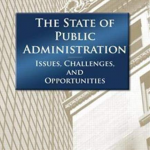Author: Donald C. Menzel

Historic Relevance Confronting Contemporary Obsolescence? Federalism, Intergovernmental Relations, and Intergovernmental Management
Collaborative public management, managing across boundaries, leveraging networks, and governance through networking are contemporary concepts that characterize a near tsunami sweeping across recent public administration literature. These novel and creative formulations describe, analyze, and prescribe complex modes of management for the current practicing public administrator. In retrospect, Rhodes (1996, 658) was prescient in claiming, “governance is about managing networks.”
The significance and relevance of the “collaboration-networking-governance movement” cannot be denied (Robinson 2006; Bingham and O’Leary 2008; O’Leary 2009). This chapter does not challenge or question the promising paths chartered in that literature. Rather, it explores the antecedents and foundation stones on which the triumvirate of collaboration-networking-governance is erected. Those-building block components are represented by federalism and its legacy concepts, intergovernmental relations and intergovernmental management, concepts that have framed governance and management thinking for decades.
Cite as:
Menzel, D., White, H., S. Wright D., Cho, C. (2011). The State of Public Administration: Issues, Challenges, and Opportunities.
…
Continued
